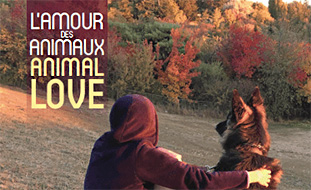Notice
Toward werewolf diplomacy: Cross-species kinship and ecopoetics in "Animal Dreams" and "Prodigal Summer" by Barbara Kingsolver / Bénédicte Meillon
- document 1 document 2 document 3
- niveau 1 niveau 2 niveau 3
Descriptif
Toward werewolf diplomacy: Cross-species kinship and ecopoetics in "Animal Dreams" and "Prodigal Summer" by Barbara Kingsolver / Bénédicte Meillon, in colloque international "L'Amour des animaux / Animal Love", organisé par le Laboratoire Cultures Anglo-Saxonnes (CAS), la Société d’Étude de la Littérature de Voyage du monde Anglophone (SELVA), l'Académie des Sciences, Inscriptions et Belles Lettres (ASIBL) de Toulouse, sous la responsabilité scientifique de Françoise Besson (CAS, SELVA, ASIBL), Marcel Delpoux (ASIBL, SELVA), Nathalie Dessens (CAS) et Scott Slovic (SELVA, University of Idaho, USA). Toulouse, Hôtel d'Assézat, Hôtel du May, Université Toulouse Jean Jaurès, 20-23 mars 2019.
Atelier 1 : Cross-species kinship and companionship.
Like one of Kingsolver’s novel titles, Animal Dreams, the concept of “animal love” is ambiguous, pointing to cross-species connections: are we dealing with animals’ capacities to dream and love, with humans’ love of animals, or, potentially, with the animality that may guide much of humans’ love and dreams? Drawing from two of Kingsolver’s novels that have not been studied from the animal perspective, this paper aims to track the intersecting points between stories of animals and humans in her ecopoetics to find out what these might reveal about our kinship with the animal world. Drawing from a theoretical and philosophical framework including Donna Haraway, Derrida, Baptiste Morizot, and Corinne Pelluchon, among others, this paper will seek to elucidate how Kingsolver’s zoopoetics reenchants our ties with animal realms. I will scrutinize some of the anthropomorphizing of critters at work in Kingsolver’s fiction, that goes hand in hand with the animalizing of humans. I will in the process broach the naturecultures of coyotes and wolves, the biosemiotics of moths, the ethics of care or lack thereof toward animal lives that transpire through various ways of handling cocks, chickens, dogs, sheep, predators, or insects, together with the animal drives Kingsolver’s ecopoetics assign human bonding and even social behavior. Throughout, I will demonstrate how Kingsolver’s ecopoetics pave the way for the type of werewolf diplomacy Baptiste Morizot has been calling for, prompting us to reconsider the very concept of human love, while remapping ontological charts of human and animal worlds.
___
Le but de ce colloque est d’envisager l’amour des animaux, l’amour animal, l’amour pour les animaux dans sa multiplicité et sous un angle à la fois philosophique, scientifique, littéraire et artistique et en inscrivant ce thème dans la relation plus large de l’homme au monde et dans la vision environnementale et écocritique. Des espèces compagnes à la relation (l’amour ?) des animaux pour des membres de leur propre espèce ou d’espèces différentes, l’expression “l’amour des animaux” est polysémique. On pense à l’amour des chiens et chats pour leur compagnon humain et à la relation réciproque de l’attachement humain pour ces êtres non-humains qui accompagnent leur vie, au chien qui accompagne son ami humain jusqu’à la tombe et va y rester des jours et parfois se laissera mourir. Que dire de ce chat américain qui dans un hôpital, va dans les chambres de malades dont il perçoit avant les médecins qu’ils vont mourir bientôt et les accompagne jusqu’à leur dernier souffle ? Comment définir son rôle gratuit et étrange d’accompagnateur qui va leur permettre le passage en leur offrant une présence amie et rassurante ?
L’amour des animaux, c’est à la fois l’amour de l’être humain pour le monde animal, l’amour -ou tout autre sentiment auquel il conviendra de réfléchir- de l’animal pour l’être humain et l’amour des animaux entre eux ; l’amour pour tout souffle de vie ; l’amour de la chatte pour ses petits, le geste de l’hippopotame tentant de sauver l’antilope de la gueule du crocodile, les soins d’une bande de chats des rues en Argentine sauvant un enfant perdu en lui apportant de la nourriture et en le réchauffant jusqu’à ce qu’il soit retrouvé. Est-ce de l’amour ? Est-ce un instinct de survie ? Une empathie inexplicable ? Comment définir la notion d’amour des animaux ? Ces gestes de tendresse, de compassion ou d’empathie du monde animal peuvent-ils être rattachés à l’amour ou sont-ils des gestes instinctifs de sauvetage de quelque espèce que ce soit visant à prolonger la présence animale sur la terre ?
The aim of this conference is to consider animal love in its multipicity, from a philosophical, scientific and literary angle at the same time, by inscribing the theme in the wider relationship of man with the world and in the environmental and ecocritical vision as well.
From companion species to the love of animals for members of their own species or of other species, the phrase “animal love” is polysemous. We first think about the love dogs and cats have for their human companions and about the reciprocal relationship of attachment of human beings for those nonhuman companions accompanying parts of their lives; we can think about the dog following his human companion’s coffin and accompanying him/her to the grave, staying there days and nights and sometimes dying there. What can we say of the American cat who, in a hospital, goes into dying people’s rooms, knowing before doctors that those people are going to die and accompanying them until their last breath? How can we define her gratuitous, strange role as a companion, allowing them to pass away while offering them a friendly, reassuring presence?
Animal love is both the human being’s love for an animal or several animals and the love—or any feeling we could associate with love—of the animal for the human being and the love of animals for one another. Can we consider the gesture of a hippopotamus for the antelope that he tries to rescue from the crocodile’s teeth, staying with her head in its mouth until her last breath, as love? What about the behaviour of a group of street cats in Argentina, who saved a lost human infant by giving him food and lying on him so that he did not die of cold in the night, until the day when he was found. Is this love? Is it some survival instinct shared with those who are threatened? Is it some unexplainable empathy? How can we define the notion of animal love? Could those gestures of apparent tenderness, compassion or empathy of the animal world be qualified as love—could they be linked with love or are they instinctive rescuing gestures made by whatever species to prolong the animal presence on the Earth?
Thème
Documentation
Bibliographie sélective
> Voir la bibliographie (à télécharger en pdf) dans l'onglet "Documents".
Dans la même collection
-
Animal Cause. Contemporary Chalenges in Brazilian Society / Zelia Monteiro Bora
BoraZélia MonteiroAnimal Cause. Contemporary Chalenges in Brazilian Society / Zelia Monteiro Bora, conférence plénière in colloque international "L'Amour des animaux / Animal Love", organisé par le Laboratoire
-
Le chien truffier dans sa relation affective avec l'homme, son maître, son ami / Pierre Sourzat
SourzatPierreLe chien truffier dans sa relation affective avec l'homme, son maître, son ami / Pierre Sourzat, conférence plénière
-
"Brown dog of the Yaak" and "Colter" by Rick Bass or a tribute to human-dog companionship / David L…
LatourDavidBrown dog of the Yaak and Colter by Rick Bass or a tribute to human-dog companionship / David Latour
-
L'homme et le chat : une histoire et un avenir communs ? (Des origines à l'Intelligence artificiell…
VercruyceBernardL'homme et le chat : une histoire et un avenir communs ?
-
Animaux réels et fantastiques dans l'art médiéval de la région Occitanie / Guy Ahlsell de Toulza
Ahlsell de ToulzaGuyAnimaux réels et fantastiques dans l'art médiéval de la région Occitanie / Guy Ahlsell de Toulza
-
De la raison à la passion pour les dinosaures et l'énigme des grandes extinctions / Marcel Delpoux
DelpouxMarcelDe la raison à la passion pour les dinosaures et l'énigme des grandes extinctions / Marcel Delpoux, conférence plénière
-
Amour-Haine ou l'ambiguïté de la relation serpentine / Pierre Lile
LilePierre C.Amour-Haine ou l'ambiguïté de la relation serpentine / Pierre Lile
-
Les loups et les ours : une histoire d'amour difficile
López MújicaMontserratpar Montserrat López Mújica
-
Le siècle de "Winnie l'Ourson" / Yves Le Pestipon
Le PestiponYvesLe siècle de Winnie l'Ourson / Yves Le Pestipon, conférence plénière
-
L'amour offert aux animaux que l'on dresse : stratagème ou complicité ? / Olivier Courthiade
CourthiadeOlivierL'amour offert aux animaux que l'on dresse : stratagème ou complicité ? / Olivier Courthiade
-
La figure du Centaure dans la littérature équestre, des représentations de l'amour du cheval / Hono…
TellierHonorineLa figure du Centaure dans la littérature équestre, des représentations de l'amour du cheval / Honorine Tellier
Avec les mêmes intervenants et intervenantes
-
Entretien avec Barbara Kingsolver
MeillonBénédicteKingsolverBarbaraRomancière, nouvelliste, essayiste et poète, Barbara Kingsolver revendique le titre "d'artiste politique", traduisant ainsi le caractère engagé de sa littérature. Ayant vécu dans son enfance au Congo













